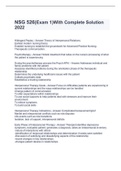NSG 526( Exam 1)With Complete Solution 2022
Hildegard Peplau - Answer Theory of Interpersonal Relations. Earliest modern nursing theory
Enabled nursing to establish the groundwork for Advanced Practice Nursing.
Therapeutic communication.
Psychotherapy - Answer Holistic treatment that relies on the nurse's processing of what the patient is experiencing
During the psychotherapy process the Psych APN: - Answer Addresses individual and family problems with the patient
Assesses identified problems during the orientation phase of the therapeutic relationship
Determines the underlying healthcare issues with the patient
Collects psychiatric data
Establishes a trusting relationship
Interpersonal Therapy Goals - Answer Focus on difficulties patients are experiencing in current relationships and the ways relationships can be handled
Change pattern of communication
To alter expectations within relationships
To use social supports to help patients deal with stressors and improve their environment To relieve symptoms To build social skills
Interpersonal Therapy Indications - Answer Complicated bereavement/grief
Marital and interpersonal conflicts such as role disputes
Life events such as role transitions
Isolation, lack of support, interpersonal deficits
Early Phase of Interpersonal Therapy - Answer Therapist identifies depressive symptoms, evaluates patient, generates a diagnosis, takes an interpersonal inventory
-nature of interactions with others
-identification of reciprocal relationships and determination if needs were satisfied -Discussion of satisfying and dissatisfying aspects of the relationship
-recent changes in key relationships
-changes patient desires in relationships Middle Phase of Interpersonal Therapy - Answer Patient and therapist derive more specific strategies to deal with stressors
Termination Phase Interpersonal Therapy - Answer Consolidate gains
Foster independence in the person
Review risk of relapse and reappearance of depressive symptoms
To contract again for continuation of treatment as needed
Group Therapy - Answer The primary purpose of group therapy is to facilitate changes by the patient in order to address identified problems
The group should be able to share the group experience and the leader should assure dominant members are brought to the attention of the group so they are able to address
issues within the process. A person explaining to the group ways that person is able to cope with things is called an "information giver".
A technique where special favors or awards are given to assure patient participation and involvement in group therapy is called Reinforcement
CBT - Answer Works by having an active and questioning therapist. It involves homework assignments, dream description, looking at ideas and beliefs the patient has about themselves with a goal to increase subjectivity about thoughts governing their behavior. Some interventions to consider when using CBT include encouraging the patient to analyze early parental relationships, the underlying meaning of behavior, identification of negative thoughts, and the effect of thoughts on feelings and behaviors
Mnemonic to identify medical mimics - Answer THINC MED
Tumors
Hormones
Infection
Nutrition
CNS
Miscellaneous
Electrolyte imbalances & Environmental toxins
Drugs
Tumors that mimic psych symptoms - Answer Frontal lob tumors - abrupt change in personality, flat affect, and/or euphoria
Occupation lobe tumors - visual hallucinations
Parietal lobe tumors - sensory disturbances, agnosia, lack of awareness appearing as denial
Temporal lobe tumors - mood & memory disturbances; hallucinations (all types), paranoid delusions
Pancreas tumors - severe depression, weight loss
Adrenal gland tumor (pheochromocytoma) - anxiety, panic attacks, sweating, rapid pulse, tremors Hypothyroidism - Answer fatigue, loss of energy, trouble thinking and depression, increased weight
Hyperthyroidism - Answer anxiety, depressive or manic episode, psychosis, weight loss,
increased activity
Children present as ADHD
Elderly present as dementia
Hypoparathyroidism - Answer anxiety, irritability, hyperactivity
Hyperparathyroidism - Answer anxiety, depression, fatigue, irritability
Cushing's syndrome - Answer excessive production of cortisol
fatigue, anxiety, depression
* Symptoms also seen in steroid use.
Addison's disease - Answer Decreased cortisol production. Confused with Persistent depressive disorder *symptoms also seen with steroid withdrawal
Increased testosterone - Answer increased physical aggression
Decreased testosterone - Answer impotence, decreased libido, depression
Estrogen - Answer increases irritability of CNS due to its effect on dopamine activity
Hypoglycemia - Answer anxiety, attention problems, irritability, night sweats, nightmares, morning headaches
Hyperglycemia - Answer drowsiness, lethargy, increased appetite, increased pulse, weight gain
*Mistaken for Persistent Depressive Disorder or Seasonal Affective Disorder
Infections that mimic symptoms of Psych disorders - Answer AIDS, syphilis, herpes, TB,
Lyme disease - all affect CNS
Mono, hepatitis - chronic fatigue and depression
Chronic sinus infection, allergies - depression, low energy, headache, sleep disturbances
Rheumatic heart disease - onset of tics & OCD
Systemic lupus erythematosis - cognitive deficits
Decreased cobalamin (B12) - Answer mood swings, paranoia, hallucinations, panic disorder, cognitive deficits (difficulty thinking)
Decreased thiamine (B1) - Answer Wernicke-Korsakoff syndrome




